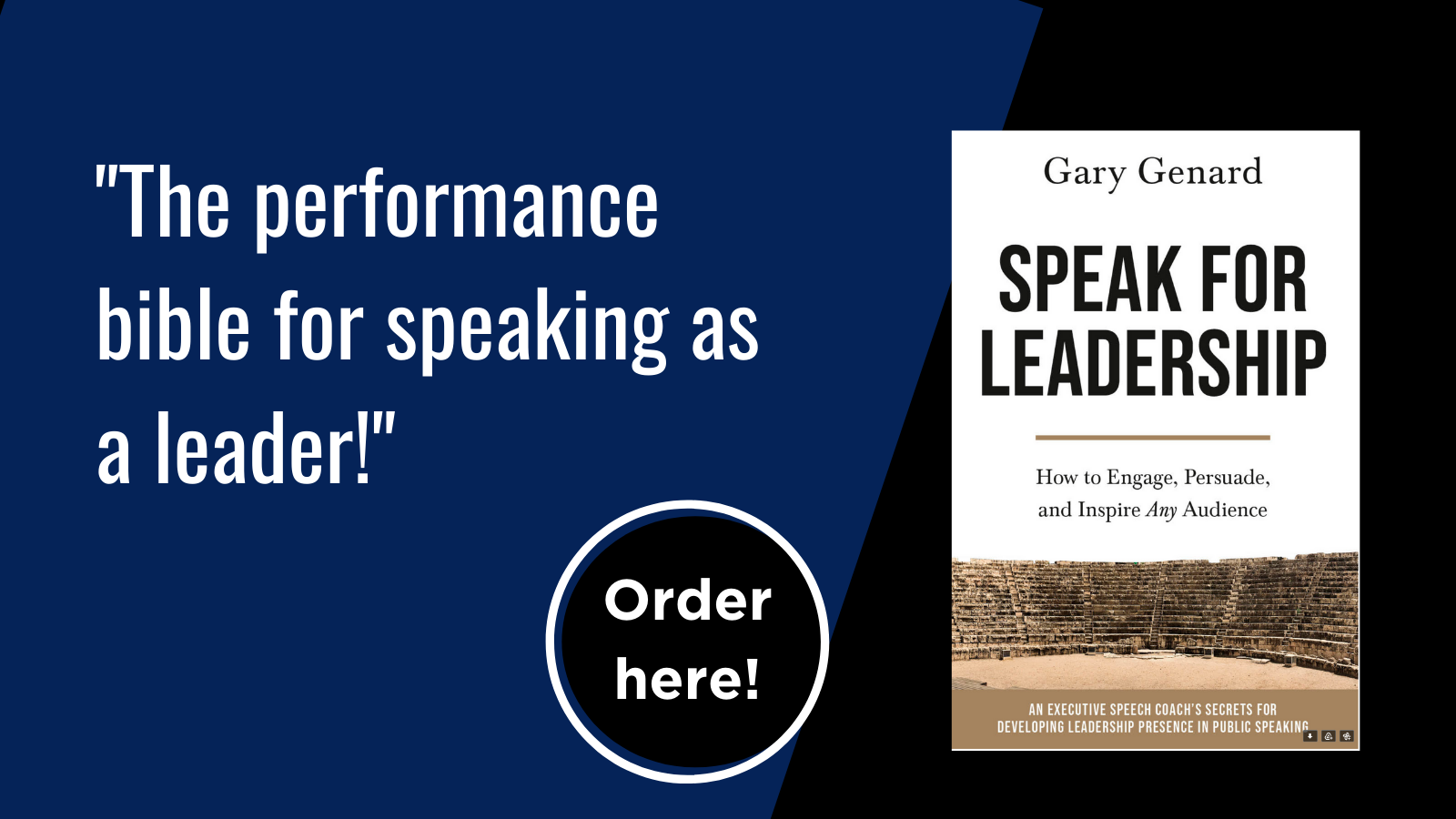Want to inject some magic into your public speaking? Here's why you need to learn stage presence for your speeches and presentations.
How are your performances in meetings, pitches, and presentations stacking up these days? Are they closer to the everyday or the magical? Can you really achieve the latter? I think so!
To give a performance that’s truly magical, though, you can’t do it the way a stage magician does—by putting something over on everyone. If anything, you need to accomplish the opposite. You must show everyone who you are in terms of authenticity, while sharing something of great value: the truth, as it relates to your topic.
We might call this 'the task of a lifetime' when it comes to influential public speaking—your lifetime. And that's a literal interpretation, since becoming an authentic and memorable speaker will benefit ALL of the public speaking you do.
If that sounds like speaking for leadership, it is! Learn more in my Free ebook, High-Impact Speaking: The Leader's Guide to Presenting With Integrity and Influence.
As James A. Whittaker puts it in The Storyteller’s Spell book:
Your life and career are spent showcasing yourself, your abilities, ideas, and contributions. . . . Simply put, your ideas and insights mean nothing if they cannot be transmitted to others. Without a good story, and the ability to tell it, your skill and passion remain trapped inside you instead of impacting the wider world.
There is a huge difference Whittaker tells us, “between transmitting facts to an audience and transforming the way people think.” Stage presence in fact is a life skill.1
Speaking with Stage Presence Means Mindfulness
It’s also a form of mindfulness. If you think of it in this way, you’ll realize that ‘stage’ presence isn’t limited to being on stage at all. It’s simply a form of being present in performance, and of being in the present. The concept of fully occupying the present moment is actually the core idea of mindfulness.
Here's some '5-minute magic' to get you there: my Free cheat sheet, "How to Calm Your Nerves Before Speaking." Download it now!
You can benefit from this form of mindfulness or presence in any aspect of your life. That certainly includes communicating with others. Of course, public speaking is the situation where you’re most likely to share your ideas with the largest audiences and gain the highest profile. Developing presence when you speak, then, magnifies your ability to be present and impact listeners positively.
There’s another intriguing idea here that isn’t often remarked upon: that this isn’t a one-way street. Both you as presenter and the audience are necessary to create presence. Having people around you who are fully in the moment brings YOU into the present. The back-and-forth dynamic that takes place when you speak before any audience is a unique format for achieving leadership presence!
And here's how to keep the clarity and influence flowing: my Free resource, "How to Be a Clear, Concise, and Compelling Speaker."
It's Not All About the Data!
Presenters everywhere make a fundamental mistake, however. Too often, they focus solely on the information they need to deliver, rather than the overall purpose they’re trying to achieve in their speech. Speaking in public, however, is always about influencing one’s audience, and never about simply delivering information. The material in your presentation is only one aspect of achieving that influence. The more vital element is you. That’s because the content is always filtered through your unique knowledge, along with your experience and passion you display.
If the essential data concerning the topic were all that mattered, wouldn’t an email, text, or social media post accomplish the task? A speech, on the other hand, is a form of community—and that’s something infinitely more immediate and possessing much greater impact. And it only really takes place if the speaker is present and making a connection with his or her listeners.
Learn how it's done! Download my Free White Paper, "7 Key Components of Successful Presentations."
Finding The Extraordinary in the Ordinary
Someone once referred to the theater as “a state of mind that both audience and actors can share and experience.”2 It’s exactly the same in a speech or presentation. There’s a reason that the words “present” and “presence” both have their origin in the Latin word praesentia.
When we think of presence like this, we arrive at an inescapable conclusion: that the skills needed to develop it aren’t extraordinary in any way. They’re the same ones you use to persuade, inspire, and entertain people when you talk about anything you’re interested in. The more you can establish a relationship with them, the more they will like you and want to listen.
That's why my earlier article in this space answered an essential question, “Can you learn leadership presence?” with a resounding "YES!"
1 James Whittaker, “Master The Art of Stage Presence,” October 6, 2015. https://www. microsoft.com/en-us/microsoft-365/blog/2015/10/06/master-the-art-of-stage-presence-with-james-whittaker/ Italics in original.
2 Sarah Pini, “Alternative Approaches to the Classic Model of Stage Presence in Performing Arts: A Review.” https://www.academia.edu/Documents/in/Presence_ Performing_Arts_.
Want to know more about commanding a stage and inspiring listeners? Get my new book about succeeding in-person and virtually, Speak for Leadership. Order below!
You should follow me on Twitter here.
Gary Genard is an actor, author, and expert in public speaking training and overcoming speaking fear. His company, Boston-based The Genard Method offers live 1:1 Zoom executive coaching and corporate group training worldwide. In 2022 for the ninth consecutive year, Gary has been ranked by Global Gurus as One of the World’s Top 30 Communication Professionals. He is the author of the Amazon Best-Seller How to Give a Speech. His second book, Fearless Speaking, was named in 2019 as "One of the 100 Best Confidence Books of All Time." His handbook for presenting in videoconferences, Speaking Virtually offers strategies and tools for developing virtual presence in online meetings. Contact Gary here.




